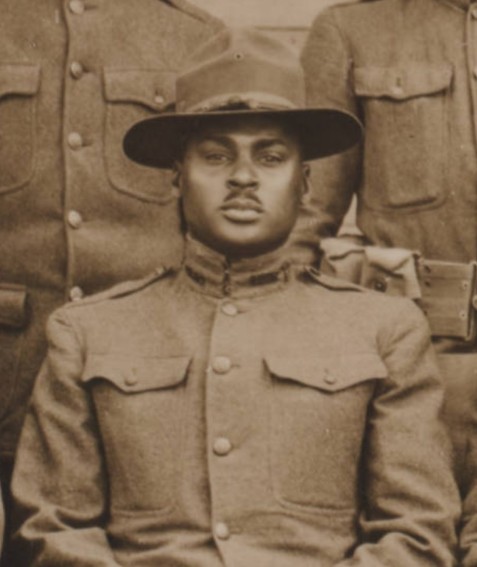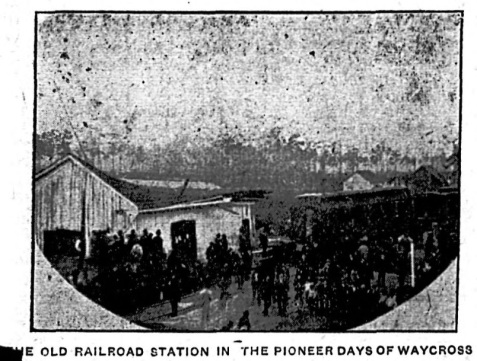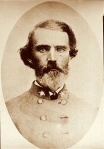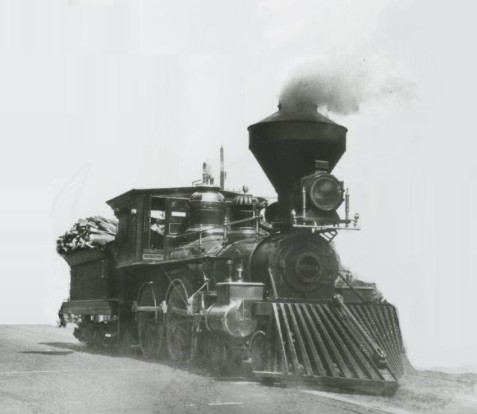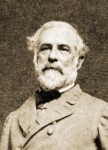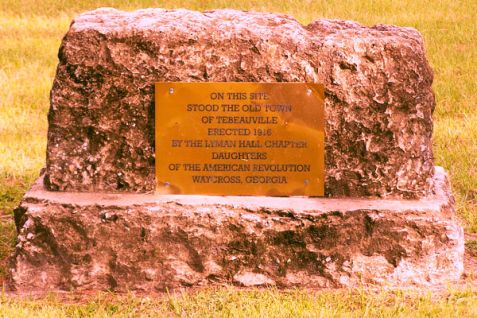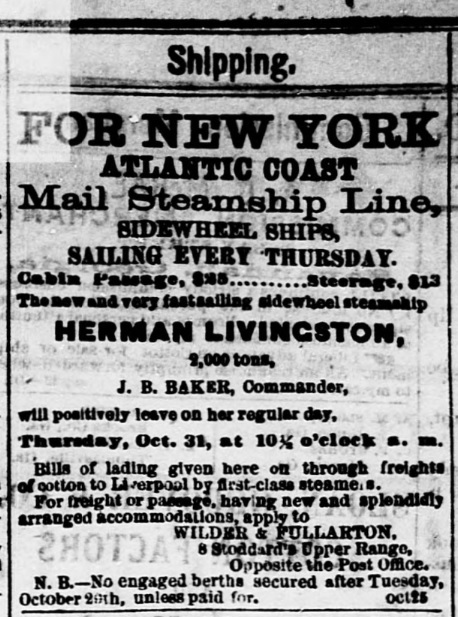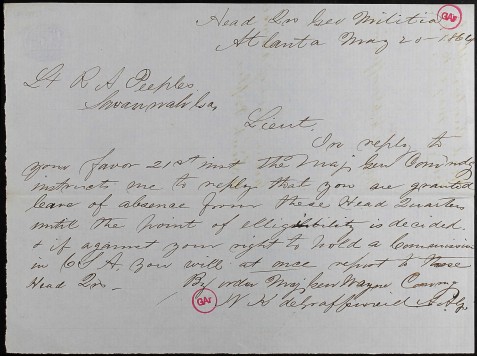The Clift Affair occurred at the Valdosta Courthouse on Saturday, April 4, 1868. The courthouse was then located on the southeast corner of what is now Central Avenue and Ashley Street. Georgia was under military rule imposed by Reconstruction.
Much of what has been written about the incident at Valdosta has minimized what would today undoubtedly be categorized as a terrorist attack.
The Clift Affair occurred just days after the Georgia Ku Klux Klan, probably under the leadership of former Confederate General John B. Gordon, began its reign of political terrorism in this state with the murder of Radical organizer George Ashburn at Columbus, GA. (Georgia would later name its largest military training base of WWI and WWII Camp Gordon in honor of General Gordon). The Radicals asserted blacks were entitled to the same political rights and opportunities as whites.
In Valdosta, group of young white men attempted to detonate an 18 lb keg of gunpowder to disrupt a gathering of freedmen attending a political rally. The speaker, Joseph Wales Clift (derisively referred to as Booby in the southern press), was a Radical candidate for the U.S. Senate seeking the vote of former enslaved people. Local public outcry over the Clift Affair in Valdosta, condemning equally the actions of the candidate and the bombers, was led by Richard A. Peeples, a prominent Confederate veteran and lawyer of Valdosta, and former Clerk of the Court of Berrien County, GA.

Joseph Wales Clift, circa 1861-1865. Source: Mathew Brady Photographs of Civil War-Era Personalities and Scenes, National Archives.
Joseph Wales Clift was born in North Marshfield, Plymouth County, MA. on September 30, 1837. He attended the common schools and Phillips Exeter Academy, Exeter, NH. He graduated from the medical school of Harvard University in 1862. He entered the Union Army and was acting surgeon from July 13, 1862, to August 7, 1865, then served in the Army of the Potomac until November 18, 1866. Afterwards he moved to Savannah, GA with his brother, Walter Lovell Clift. J. W. Clift established a medical practice and Walter L. Clift practiced law. J. W. Clift joined the Georgia Medical Society and was elected Librarian of the organization in January 1867. The brothers became activists encouraging freedmen to exercise their right to vote which had been granted in the Sherman Military Bill. J.W. Clift spoke at a Savannah gathering of several thousand freedmen on March 18, 1867. On May 25, 1867, the Atlanta Daily Intelligencer announced J. W. Clift had been appointed to the board of voter registration for the city of Savannah by order of Major General Pope under the Reconstruction Acts. Of the 5,330 voters registered in Savannah that year, 3,061 were African-American. At a meeting for the organization of the Republican Party in Chatham County, J. W. Clift was elected as a delegate to the Republican State Convention to be held July 4, 1867, in Atlanta, GA. Both brothers spoke at the Savannah Republican rally October 21, 1867, attended by about 4000 freedmen according to the Atlanta Daily Intelligencer. W. L. Clift was a delegate to the state constitutional convention. In early 1868, Dr. J. W. Clift was considered as a Radical candidate for mayor of Savannah, but at a mass meeting of freedmen on March 16. 1868 he was nominated as the Radical candidate for the U. S. Congress.
Hitting the campaign trail, J. W. Clift came to Valdosta, Lowndes County, GA. In Pines and Pioneers, J. Shelton described Cliff’s event here:
A candidate for Congress, J. W. Clift arrived in Valdosta to make a campaign speech. Clift sought the Negro vote, and he scheduled an address for Saturday night, April 4, 1868. Without bothering to secure from the authorities the required permission to speak publicly, Clift began his talk to an audience at the courthouse. There was an explosion, for a group of young Confederate veterans had placed a keg containing a “small modicum of powder” beneath the building. No one was hurt, but the young men succeeded in breaking up the meeting.
Primary sources on the Valdosta bombing attack, the Valdosta Times and Savannah Daily News and Herald, ensconced the event in a shared language that derides the victims and excuses the perpetrators. language that many references have maintained up to the most recent years.
The political candidate, Dr. J. W. Clift was constantly referred to as a “prowling, sniveling booby,” “vagrant scalawag, ” or “carpet bagger.” The terms scalawag and carpetbagger have sometimes been redefined in the modern narrative as neutral; scalawags were “southerners who supported Reconstruction” and Carpetbaggers were “northerners who came south after the war to seek their fortune through politics.” But in 1868, these terms were unquestionably pejorative; carpetbaggers were unscrupulous Yankee profiteers and scalawags were the white southern traitors who collaborated with them and the freedmen. In a clipping from the South Georgia Times reprinted August 20, 1868, in the Atlanta Constitution, Berrien County bragged that it had no scalawags: “NO SCALLAWAGS IN BERRIEN! No scalawags in Irwin and Telfair, and that’s the reason no election is ordered for those counties. Y.M.D.C. is organized here, but there is not enough radicalism to keep it lively.” (The Young Men’s Democratic Club was the public political wing of the KKK,) Dr. Clift’s brother, Walter L. Clift, a lawyer and delegate to the state constitutional convention, was referred to as a “little cheese-eyed man” and both the Clift brothers were alternately tagged with the description as “a sour little fellow, with weak, wicked eyes…[and] industrious imbecility.” In an extended tirade, the Thomasville Enterprise referred to Dr. Clift as “a silly, overweening school boy, about to be elevated above his capacity…we were never more astonished at the extreme feebleness and want of prestige and capacity in a candidate for so high an office…Such is the contemptible creature who has the effrontery to ask the colored citizens of this district for their votes to send him to Congress of the United States… an unknown adventurer, destitute of talents, character, courage and every manly attribute – an ignorant, insolent upstart, who in the face of an outraged and indignant community, meanly seeks by falsehood and misrepresentation, by appeals to the prejudices and passions of their newly enfranchised race – by hypocrisy and deceit and every base and contemptible artifice, to obtain a position for which he is neither intellectually, morally, legally or socially qualified.
White Valdostans asserted that by holding the meeting, Dr. Clift himself precipitated the incident – that he was acting “illegally” since he did not have the approval of civil authorities, although the entire state was then under military rule and Clift was exercising free speech to address a peaceable assembly. The Valdosta Times even suggested that J. W. Clift planted the bomb himself, in a diabolical plot to implicate “the poor rebs,” widen the divide between the “good men” of Lowndes County and the “Negroes,” and create a sensation among his black supporters.
Valdosta Times referred to Clift’s audience as “a mass of villainy, ignorance and vagabondism,” and the “ignorant and credulous classes.” The Valdosta Times wrote that the gullibility of the freedmen was illustrated in their naive belief of Clift’s statements that “white men would have to pay the tax to educate negro children.
The conspirators were just “some of the boys [who] concluded to have a little fun.” They only “intended to create a ‘big scare’.“
The bomb was just a “prank“…“a small modicum of powder, enough to make a little fume with the aid of fire.” Further, it couldn’t have been a real bomb because it was preposterous that any white man would have risked accidentally blowing himself up in the company of “negroes.“
Subsequent reports suggest that the conspirators and their allies, having failed in the full destructive effects of the explosion, further broke up and dispersed the crowd of freedmen by force of arms, surrounding the Courthouse building and holding it throughout the night. At the time of the bombing on Saturday April 4, 1868, Valdosta and all of Georgia was still under the federal military occupation of Reconstruction, and Federal officers viewed the civil unrest as a collapse of local authority. Albert B. Clark, Freeman’s Bureau agent at Quitman, “quickly reported to military headquarters at Thomasville that a riot had occurred and that local authorities were ‘powerless’ to do anything about it.“
By Monday, April 6, newspapers all over the country were mentioning the Clift Affair in Valdosta, many attributing the violence to the KKK.
The Philadelphia Age
April 6, 1868
At a Republican meeting at Valdosta, Georgia, Saturday night, a disturbance was caused by the discovery of a keg of powder under the speaker’s desk. The meeting dispersed amid general excitement.
οοοοο
Janesville, Wisconsin Gazette
April 6, 1868
The Tribune’s special Savannah of the 5th says the Republican meeting at Valdosta yesterday was broken up by a band of regulators of Ku Klux Klan. Powder was placed under the building in which Dr. J. W. Cliff, the Republican candidate for Congress was to speak.
A New Georgia Encyclopedia article on Reconstruction violence in Georgia notes “It is impossible to untangle local vigilante violence from political terrorism by the organized Klan, but it is clear that attacks on blacks became common during 1868. Freedmen’s Bureau agents reported 336 cases of murder or assault with intent to kill on freedmen across the state from January 1 through November 15 of 1868.”
At Valdosta, a number of concerned white residents met to discuss the bombing and attorney Richard A. Peeples, was called to the Chair. Peeples was a former Clerk of the Berrien County Courts. R. T. Myddleton was appointed Secretary. Following a motion by Col. A. J. Little, Chairman Peeples appointed a committee to draft a resolution expressing condemnation of the actions. The committee, consisting of Henry Burroughs Holliday, Col. A. J. Little, B. F. Moseley, G. T. Hammond, and M. C. Morgan quickly composed the following:
Whereas one J. W. Clift a candidate for Congress came to this place on Saturday last, and without giving to the civil authorities the notice required by military orders – so as to enable said authorities to have a police in readiness to preserve order – did at night hold a meeting composed of a large number of negroes, many of whom were armed and standing as guard around the house.
And whereas, certain irresponsible parties did, in a most irregular and disgraceful manner disperse and break up said meeting – thereby endangering the lives of many persons – much to the regret of all good citizens,
We the citizens in meeting assembled, do hereby, express our condemnation and dissapproval of said riotous conduct.
˜ ° ˜
On the evening of Monday, April 6, the civil authorities at Valdosta moved to preempt military intervention in the case. The Mayor of Valdosta, M. J. Griffin, ordered the arrest of the five suspected conspirators in the bombing: A. H. Darnell, J. D. Calhoun. Iverson L. Griffin, B. L. Smith and J. J. Rambo.
A slightly more detailed version of the events in Valdosta, highly sympathetic to “the boys,” was published in the Savannah newspapers.
Savannah Daily News and Herald
April 10, 1868
The Booby Clift Affair in Valdosta
Our readers have had rumors of a muss of some sort got up by the vagrant scalawag who aspires to represent the negro constituency of this District in Congress. We have heard various statements in regard to the affair, but nothing authentic until we met the following in the Valdosta Times of the 8th inst. The editor says:
On Saturday night last there was quite a stir in our town. One Clift, surnamed booby, was here to make a speech, to induce the colored people to vote for him. He went illegally to work, having no fear of the military before his eyes, called his meeting, went to speaking, sans ceremonie, without so much as saying “by your leave, Mr. Mayor.” Having placed himself in the wrong by his lawless course, it is not to be wondered that there was as little sympathy for him as for his cause. Some of the boys concluded to have a little fun, and placed under the building a keg in which it was said there was a small modicum of powder, enough to make a little fume with the aid of fire.
Another version of it is, that it was placed there with the cognizance of the said Clift, surnamed as above, for the purpose of making a finishing stroke to the poor rebs, as thereby and therein they were to be demolished indirectly by the gunpowder, but directly by his masterly strategy. It is idle to suppose that there was any intention on the part of the boys, if they did it, to blow up their friends and relations, some of whom were in the building. They intended a “big scare” and carried out their purpose quite effectively.
We condemn in the strongest terms we can use, all such proceedings. They are both unlawful and unjustifiable. They tend to harm the cause they would subserve. The negroes will, of course, be inclined to listen to those who will endeavor to persuade them that it was really the intention to blow them up, and thus the breach be widened that good men are endeavoring to close up as far as may be practicable and right. And so far as this goes Clift has been partially successful, if his is the strategy that laid the explosive train.
Our citizens have had a meeting and condemned this procedure in unqualified terms of disapproval.
The strong presumption is that this diabolical gunpowder plot was “a weak invention of the enemy” – a resort of the prowling, sniveling Booby to create a sensation and to increase his electioneering capital with his ignorant and credulous classes.
The idea that the young men of Valdosta would attempt with a handful of powder to blow up such a mass of villainy, ignorance and vagabondism as must have composed Booby’s auditory, is perfectly absurd – especially when it is considered that the Guy Fawkes of the enterprise in exploding the powder, to which no train or fuse was set, must necessarily have blown himself up with the rest. However fearless and self sacrificing the projector of such a plot might be, it is utterly preposterous to suppose that any white man would be willing to be blown to Ballahack or anywhere else, in such company.
οοοοο
Valdosta Times
April 8, 1868
We are sorry that the Radicals have not sent a man of sense to run as a candidate for Congressional honors in the First Congressional District. The negroes yesterday “damned” Clift “with faint praise.” His speech was a feeble, sickly tirade against somebody or something, or nobody or nothing. Not one of his hearers could tell to-day what he said or what he meant. Some of them seemed to arouse when he said that white men would have to pay the tax to educate negro children. The response of one was “Bress God, brodder, let us pray.’’ The more sensible among them know how to estimate such a pretender. They are not quite so senseless as he took them to be.
Valdosta Times April 8th.
About the accused, this much is known:
- IVERSON L. GRIFFIN
Eighteen-year-old Iverson L. Griffin was the son of a wealthy planter and merchant of Valdosta. His father, Thomas B. Griffin, had served as a Confederate state senator of Georgia from 1861-1863 and was therefore disallowed from taking the Oath of Allegiance to restore his U.S. citizenship. His father had been the owner of 12 enslaved people, including 4 mulatto children under the age of 4. It is also noteworthy that the Mayor of Valdosta at the time was M. J. Griffin; the only M. J. Griffin that appears in the Lowndes County census records of that period is Iverson Griffin’s brother, Marcus J. Griffin.
- JOHN DANIEL CALHOUN
At the time of the Clift Affair, 24-year-old John Daniel Calhoun was a deputy sheriff of Lowndes County, GA. Census records suggest he may have been orphaned at an early age. His early childhood was in the household of Harmon Sapp. In the 1860 census, he was enumerated as a teenager in the household of William Bradford, working as a laborer. Also in the Bradford household was Richard Ault, who would later serve as blacksmith for the Berrien Minute Men. By the 1880s Calhoun would move to Berrien County, GA where he farmed in the 1145 Georgia Militia District. In 1905 he was serving as Postmaster in Crossland, GA.
- ALEXANDER H. DARNELL
Darnell was a young merchant of Valdosta. He was native of Kentucky and the first record of his presence in Lowndes County is his signature on the Oath of Allegiance to the United States, signed October 18, 1867. He was 25 years old at the time of the Clift incident. He died in Lowndes County in October 1869 from an “abscess of the liver”.
- JOHN JAMES RAMBO
Rambo, age 17 at the time of the Clift Affair, was an orphan of Confederate veteran Dr. John Rambo and Mary Ark Ryals. According to The Rambo Family Tree, his parents were both born in England and immigrated to Georgia. His father received his medical degree at the Medical College of Georgia in Atlanta, graduating in 1847. John J. Rambo was born January 18, 1851, in Perrys Mill, Tattnall County, Georgia. After his mother died of brain fever in 1859, his father married a second time to Maria Clifton. His father was enumerated in 1860 as the owner of 7 enslaved people. During the Civil War, his father served as a surgeon in the 47th Georgia Infantry Regiment, rising to the rank of Major. His stepmother died on March 14, 1862. His father left the army on September 17, 1862, because of a physical disability. Sometime during or prior to 1863, John J. Rambo came with his father to live in Valdosta, leaving his half-brother William in the custody of his Clifton grandparents. John’s father died in Valdosta about August 28, 1864, at the age of 34. After the Clift Affair in Valdosta, John J. Rambo and some of his Ryals relatives kidnapped his younger stepbrother, William Rambo, and traveled by boat to New York. There, John J. Rambo studied to become a doctor and took up medical practice in Brooklyn, NY for the remainder of his life.
Mayor Griffin’s quick action was temporarily effective in preventing intervention by military authorities. By the time Lt. Bard and Corporal John Murray, US Army, arrived in Valdosta with a detail of federal soldiers the five suspects were already in civil custody. For the time being the U. S. soldiers took no action. But a week later, after the alleged bombers were released on bond, the soldiers moved overnight to arrest them and transported them to Savannah for confinement in the federal barracks. Valdosta Mayor M. J. Griffin protested the military arrests and Thomas B. Griffin, father of Iverson L. Griffin, traveled to Savannah to visit the accused in jail. The South Georgia Times report of the arrest was reprinted in the Savannah Daily News and Herald, along with an exchange of telegrams between Mayor Griffin and military authorities.
Savannah Daily News and Herald
April 10, 1868
The Military Arrests in Valdosta.
{From the South Georgia Times}
We are sorry to have to state that Monday night last some of our young men were taken from their beds and immediately hurried off to Savannah by United States troops, we presume to undergo military trial. It is alleged that they were engaged in the gunpowder sport referred to in — last. They have already given bond – the four are under arrest – to appear and answer before the civil tribunals. Our Mayor and Sheriff promptly discharged their duty in the premises. The hardship of the case is, that civil law has but a name. The iron is —ering in into the soil, and liberty and law is fast passing away. These young men are to be tried where perhaps their case is already prejudged, far away from their homes and sympathy and kindness of friends. Time was when such an act would have fired the great heart of the country from one end of is bounds to the other. They should have been tried by their peers of the vicin– — age, and if guilty of the violation of law, punished as that law would punish them, and not at the behest of prejudiced strangers.
Our Mayor sent the following telegram to Gen. Meade relative to what had been done here. General Meade’s reply is appended. Alas! for the rights for which our fathers fought, and of which we have so much boasted.
A telegram was received by Mr. M. J. Griffin, at 6 o’clock yesterday, from Mr. T. B. Griffin that “the boys were all comfortably quartered in the barracks, and well cared for.”
Valdosta, April 14, 1868
Major Gen. Meade, Atlanta, Ga.
Sir: – At a late hour last night, without my knowledge, a party of U. S. soldiers arrived here and carried away the following persons, viz. A. H. Darnell, Iverson Griffin, John Calhoun, Ben Smith, John Rambo – who are alleged to have been concerned in a riot at this place on the 4th inst. These men, as Mayor, I had arrested and bound to appear at the Superior Court of this county to answer for the same. I respectfully request to be informed if they were arrested by your order, and if not, that they be released and take their trial before the civil tribunals of the county.
I have the honor to be,
Your Obedient Serv’t
M. J. Griffin,
Mayor Valdosta
Atlanta, GA., April 14th, 1868
M. J. Griffin, Mayor Valdosta:
The persons named in your telegram were arrested by General Meade’s order, and will be held for trial by Military Commission.
R. C. Drum, A. A. G.
In subsequent days state and national newspapers provided additional details.
The Macon Georgia Weekly Telegraph
April 24,1868
The Clift Electioneering Trick At Valdosta.
Yesterday, Lieutenant Bard, United States Army, arrived in this city on the train from Valdosta, having in charge five young men, whom he had arrested there the day previous, on a charge of having been the originators of the disturbance which occurred at that place on last Saturday night week. –
This is the general supposition, as nothing was said by the arresting officer of the why and the wherefore of their being taken into custody. Their names are Alexander H. Darrell, John Calhoun, John Rambo, Benjamin L. Smith and Iverson L. Griffin. They are all young men of good family, and entirely innocent of all blame in the matter. Mr. Calhoun was Deputy Sheriff of Lowndes County, and a faithful and efficient officer.- Mr. Griffin was not present at the Court House on the night in question, and in no way connected with the affair. Thus are innocent men torn from their families and thrust into prison by the strong arm of military power, and made to suffer by the rascality of a Radical carpet-bag adventurer. [Sav. Rep., 15th.
οοοοο
Indianapolis Journal
April 30, 1868
ATTEMPT TO BLOW UP A REPUBLICAN MEETING – Information has reached the Congressional Committee rooms that on Tuesday last [Saturday, April 4, 1868] an attempt was made to blow up the Court House at Valdosta, Georgia, where a Republican meeting, composed mostly of colored people, was being addressed by Dr. J. W. Clift (white). A keg containing eighteen pounds of powder had been purchased at a store in the place, and a portion take out to make a train, and the remainder of the powder was placed under the Court House. Fortunately the cask was discovered and removed in season, but the train [fuse] was fired, and in an attempt of the persons present to escape, they were fired upon by a gang of white men outside, who had surrounded the building. This party held possession of the place that night, but on the next day they were dispossessed by the military, and the meeting was held.
οοοοο
Bedford Inquirer
April 17, 1868
Terrorism In The South
Our Democratic brethern would have the people believe that the South would be a perfect paradise if such men as Meade, Pope, Sickles, Sheridan, &c., were kept away. General Hancock has had several months control of the Southwest trying to carry out a different policy from that of the before-mentioned heroes with what results is indicated in the following article from the Pittsburg Chronicle of a few days ago:
The dispatches which we published in yesterday’s issue, relative to the brutal murder of Hon. George W. Ashburn, of Columbus, Georgia, by a gang of villains in disguise, and the breaking up of a Republican meeting at Valdosta, Georgia, by a band of regulators of the Ku-Klux Klan, come at the heels of much similar information through letters and newspapers, and show that in portions of the South, a reign of terrorism is in actual operation. It verily seems that these ill-fated people are moved by some malignant fatality to thwart all efforts which look towards their gradual restoration to order and prosperous enterprise. Not satisfied with opposing every political measure that has been devised to enable them to get out of the dreadful slough in which they were left upon the suppression of the rebellion, they are actually engaged in the suicidal business of convulsing society so utterly by lawlessness, as to put a complete quietus upon the views and schemes of all those adventurous Northern capitalists, who had begun seriously to meditate risking their families and fortunes in the South…It is not pleasant for us to be compelled to state that at present, in many Southern States, it would he unsafe for a Northern man to buy property and attempt to carry on any farming or manufacturing enterprise. We have never gone out of our way to give added circulation to the prejudicial stories that are periodically current about the South. Whenever we could, consistently with the truth, present the bright side of the picture, we have cheerfully done so. But it is, in our judgment, perfectly clear from the accumulated information which pours in upon us, that, notwithstanding the cheerful fancies of such military optimists as General Hancock, there is an immense amount of crime perpetrated in Tennessee, Georgia, Texas, and portions of Arkansas and Missouri. How far it would be possible to curb these excesses by military power we cannot determine. It is probably impossible to keep perfect order over so wide an area and amongst a population so thoroughly demoralized by a long and unsuccessful war. Years will elapse before anything bearing the faintest semblance to the orderly and regulated institutions of the North will prevail. Then will slowly set in a desirable immigration, and the wasted and cursed South will begin to recover, to get strength,to enjoy the blessings of law, and to reap the fruits of sensibly directed industry.
The citizens of Lowndes County presented a bond for the release of the alleged bombers to the military authorities in Savannah, but this offer was rejected.
STILL IN CUSTODY – The young men who were arrested by the military at Valdosta, because Dr. Clift attempted to blow himself up with gunpowder, for political capital, are still held in custody at the United States Barracks in this city, awaiting the orders of General Mead.
The men were kept incarcerated through the election of 1868, and for a couple of weeks afterward. After about a month of confinement, the suspects were finally released on bail secured by citizens of Savannah.
May 8, 1868
Release or the Valdosta Prisoners on Bail.
—Yesterday Messrs. A. H. Darnell, J. D. Calhoun. Iverson L. Griffin, B. L. Smith and J. J. Rambo, who, it will be remembered, were arrested on suspicion of being implicated in the supposed attempt to blowup a Radical meeting at Valdosta, previous to the election, while one Clift was addressing it, were released on bail in the sum of $10,000 each, to appear for trial when summoned by the military authorities. This was done by order of General Meade. Captain J. L. Moseley brought to the city a bond of $60,000 of the citizens of Lowndes county, which Col. Maloney would not accept, and six citizens of Savannah, representing nearly $200,000, offered themselves as security, were accepted and the prisoners released. The late prisoners requested us to publish the following:
Savannah, Ga., May 8, 1868.
Editors News and Herald: We, the Valdosta prisoners, who have been confined in the United States Barracks at this place, wish, through your paper, to render our thanks to Col. Maurice Maloney and his command, for their kind treatment, both to us and to our friends who visited us.
Yours Respectfully,
A. H. Darnell, Iverson L. Griffin, J D. Calhoun, B. L. Smith, J. J. Rambo, Savannah, GA, May 8,1868.
To the Citizens of Savannah: We wish to return our thanks for their kind attention and hospitality while we were in confinement at this place in the United States Barracks, and to the noble-minded merchants who have so generously stood our most unreasonable bail required by the military authorities. We trust we may at some future time be in such a position as to repay the many obligations under which we have been placed.
A. H. Darnell, Iverson L. Griffin, J D. Calhoun, B. L. Smith, J. J. Rambo,
The Georgia Election of April 1868
The election of 1868 was a four-day affair which commenced on April 20. Throughout the voting period, the southern newspapers maintained a cacophony of allegations of voter fraud, corruption, official vote rigging, coercion, voter ignorance, and other irregularities. By 1867, the conditions of Reconstruction required an Oath of Allegiance to the United States in order to be listed in the register of qualified voters. White southern men whose national citizenship had been renounced by way of the Ordinance of Secession, oaths of abjuration of national citizenship, oaths of allegiance to Confederate states, or acceptance of Confederate citizenship were required to swear a new Oath of Allegiance to the United States in order to have their national citizenship restored and to qualify for the right to vote. Some whites who had held posts in the Confederate government or the governments of Confederate states were disqualified from having their citizenship restored through the oath of allegiance.
The April 1868 election in Georgia was a vote for state officers and U.S. congressmen and a vote on ratification of a new state constitution. When the votes were counted, the new constitution was approved by a vote of 88,172 to 70,200. In the race for Governor, Rufus Bullock defeated Confederate General John B. Gordon 83,527 to 76,356. In the elections for state representatives, Radicals won 84 of the 172 House seats (29 of them black) and came within three seats of taking control of the House. In the state senate, however, the Radicals (3 of them black) carried a solid majority, with 27 seats to the Democrats’ 17 seats. The Radicals asserted blacks were entitled to the same political rights and opportunities as whites.
Clift Wins Seat in House of Representatives
Under Reconstruction, the results of the election were subject to certification by the military authorities. In the announcement made by General Meade, Military Governor of the Third Military District, the winner in the First Congressional District of Georgia was declared to be Dr. J. W. Clift.
Milledgeville Southern Recorder
July 7, 1868
Headq’rs Third Military District, Department of Ga., Fla. and Ala.,
Atlanta, Ga., June 30, 1868.
General Orders No. 93,
From the returns made to these Headquarters by the Boards of Registration, of the election held in the State of Georgia for civil officers of said State and for members of Congress, under the provisions of General Orders No. 40, (Paragraph III,) issued from these Headquarters, which election commenced on the 20th day of April, 1868, and continued four days, it appears that in said election the following named persons were elected Representatives to the Congress of the United States from the Congressional
Districts to their names respectively attached, viz:
First District—J. W. Clift.
Second District—Nelson Tift, Sr.
Third District—W. P. Edwards.
Fourth District–Samuel Gove.
Fifth District—C. H. Prince.
Sixth District—John H. Christy.
Seventh District—P. M. B. Young.
By order of Major General Meade.
R. C. Drum,
Assistant Adjutant General.
Following the ratification of the 14th Amendment by the newly elected Georgia General Assembly, the US Congress initially readmitted Georgia to the Union in July 1868.
The 14th Amendment to the Constitution was ratified on July 9,1868, and granted citizenship to “all persons born or naturalized in the United States,” which included former slaves recently freed. In addition, it forbids states from denying any person “life, liberty or property, without due process of law” or to “deny to any person within its jurisdiction the equal protection of the laws.” By directly mentioning the role of the states, the 14th Amendment greatly expanded the protection of civil rights to all Americans and is cited in more litigation than any other amendment.
Joseph Wales Clift served in the Fortieth U.S. Congress from July 25, 1868, to March 3, 1869.
Second Valdosta Attack on Representative Clift
Representative Clift did not enjoy a triumphant return to Valdosta. While passing through the “notorious” town in October 1868, he and his brother, Walter Lovell Clift, were again assaulted and their lives threatened.
Manitowoc Tribune
October 8, 1868
We are informed that about ten days ago Joseph W. Clift, M. C. [Member of Congress] from Southern Georgia, while riding in the cars on the Atlantic and Gulf Railroad, with his brother was treated in a manner which shows conclusively that free speech is not tolerated in that section of the country.
When the train stopped at Valdosta a town of one thousand inhabitants, distant from Savannah about one hundred and twenty miles, a large crowd surrounded the cars, and some fifteen or twenty ruffians, armed with heavy sticks, entered the car with the avowed purpose of taking them out and lynching them.
They were only prevented from doing this by the urgent entreaties of several prominent men, one of whom was an elector on the democratic ticket. The argument of the gentleman was, that the ‘boys mustn’t do it because it would injure the party and town!’ The crowd outside becoming weary of waiting for the sport to commence, hooted and yelled ‘Bring the d—-d Radical out!’ and again the roughs seemed determined to accomplish their purpose but were again met by the same objections on the part of their friends and after heaping all manner of insults on them offensive gentlemen were quietly passing through their town, reluctantly relinquished their purpose and left the train. This town Valdosta enjoys an unenviable notoriety as the scene of a Ku-Klux monstralation last April when a band of forty or fifty armed men first placed eighteen pounds of powder under the Court house where Dr. Clift was about to address a Republican meeting and when by accident the infernal plot was discovered just in season to prevent their drunken tool from firing the train [fuse] and hurling three hundred people into eternity, the meeting was broken up by violence, and the mob took and held the town all night threatening to assassinate prominent Republicans and rendering it necessary to send for military aid before the meeting could proceed.
Several persons prominent actors in the April affair, and now under bonds of $10,000 each for their participation in the same were leaders in the recent attack.
Returning to Washington, DC, Clift presented credentials as a Member-elect to the Forty-first Congress but during the recess period actions in Georgia, including the expulsion of black legislators from the state Assembly and the Camilla Massacre, had resulting in the re-imposition of Reconstruction and federal military jurisdiction for the state under the command of General Alfred H. Terry. With Georgia’s return to un-reconstructed status and martial law, Clift and the other representatives and senators of Georgia were not allowed to take their seats in the U.S. Congress.

“Southern Justice,” Thomas Nast sketch of Reconstruction violence, Harpers Weekly, March 23, 1867 depicted a scene in Texas but aptly portrayed the events of the Camilla Massacre which occurred in Georgia on September 19, 1868.
In January 1870, General Terry, military governor of the district of Georgia, removed ex-Confederates from the Georgia General Assembly, replaced them with the Radical runners-up, and then reinstated the expelled black legislators. “Terry’s Purge” established a solid Radical majority in the Georgia legislature, which ratified the Fifteenth Amendment in February 1870 and chose new senators to send to Washington.
The 15th Amendment to the Constitution established voting rights for African American men by declaring that the “right of citizens of the United States to vote shall not be denied or abridged by the United States or by any state on account of race, color, or previous condition of servitude.” Although ratified on February 3, 1870, the promise of the 15th Amendment would not be fully realized for almost a century. Through the use of poll taxes, literacy tests and other means, Southern states were able to effectively disenfranchise African Americans. It would take the passage of the Voting Rights Act of 1965 before the majority of African Americans in the South were registered to vote
On July 15, 1870, Georgia became the last former Confederate state to be readmitted to the Union.
Upon the withdrawal of federal military rule from Georgia, the rise of KKK terrorism quickly suppressed the newly gained civil and political rights of southern blacks. When the midterm election put white supremacists back in control of the state senate, Governor Bullock resigned and fled the state rather than face impeachment by a hostile legislature.
Speaking from the steps of the Continental Hotel, Washington, D. C. on November 29, 1871, Dr. Joseph W. Clift made an impassioned appeal to the Radicals of Georgia, which was printed and circulated in a political leaflet.
AN ADDRESS TO THE REPUBLICANS OF GEORGIA.
Governor Bullock having resigned, and the duly elected Representatives of the people having decided by an overwhelming majority that a Governor should be elected for the unexpired term, on the 19th of December, 1871, leaving only twenty days to organize a campaign under peculiar circumstances, and understanding that prominent Republicans, whom I honor and respect, have discussed the advisability of sustaining the veto of Governor Conley, by refusing to nominate or vote for any person for Governor, on that day, thereby letting the election go by default, I am prompted to write this letter and advocate, with such vigor as I may, exactly the opposite course of action.
I admit the arguments of my friends:
First. That there is little time to prepare for such a contest.
Second. That Governor Conley’s action, together with the silence of the Republican Representatives, who apparently acquiesced in it, have some force.
Third. Some minds may also be influenced by the depressing influences which still remain as the result of the election last December; and by the additional reason, that challenging for non-payment of the poll-tax, will prevent many colored Republicans from voting.
It has been said to me, let Governor Conley’s position be legal or illegal, it furnishes the Republican party an excellent excuse for not voting, and being badly beaten, the conditions being so unfavorable to their success in the contest. To many, these reasons, with other reasons, may be conclusive against our party running a candidate, and voting December 19; to my mind, they are not good reasons for such a course of action, and I sincerely hope our friends will immediately reconsider the question , and so far from letting the election “go by default,” make the above reasons alleged as sufficient to deter us from contesting the election with our Democratic friends, reasons for putting forth the most earnest and vigorous efforts to organize the party and meet the old enemies of Equal Rights, and exact justice to the colored man fairly and squarely in the teeth, and do brave battle for some pure-minded, honest Republican, who, if elected, will serve out the term with credit to himself and benefit to the State.
I am thoroughly convinced that this is the very best course for us to pursue. The contrary course seems to my mind neither wise, brave, patriotic, or just. We have as much time to work for the election as our opponents.
Governor Conley’s position is at least of doubtful legality, and even if it were technically correct, the voice of the people, speaking through their Representatives, speaks in thunder tones, and most emphatically—and as I think wisely—construes the language of the Constitution of Georgia to mean that a new Governor must be elected next month.
Neither brief time for preparation, Governor Conley’s position, the result of the last election, or the inability of our friends to pay their taxes, should for one instant shut our ears to this call of the people. It must, will, and ought to be obeyed at any cost.
The wishes of the people are entitled to respect, and the individuals, or party, who fail to heed them when so plainly expressed, and on so important a question as the one pending, will do itself great wrong, and suffer in the end accordingly.
I never did, and do not now believe in shirking a fight with Democracy under any pretext however specious, and circumstances however discouraging.
We ought to be ready and willing to meet them whenever and wherever duty calls, and defend the great principles advocated by our party since ’56, and by many good men long before.
These principles are as good and true to-day as ever they were, and the bitter and relentless warfare waged by our unscrupulous opponents against everything which tends to unshackle the hands of the honest laborer of Georgia—and everywhere else—should only nerve every man of us to “gird up his loins” and fight like heroes for the education and elevation of the masses, and the defeat of the cardinal principles of Democracy.
Instead of giving up the fight, let it be continued, and give them no quarter, till the last stronghold of the greatest foe of Liberty, and Equal Rights in this country, shall be carried, and they shall surrender to the cohorts of Freedom, and to the Civilization of the nineteenth Century.
If we would save our “Common School System,” in Georgia, and preserve the liberties of the people, we must fight it out with them, if we all go to our graves before the cause is finally triumphant. But triumphant it will be, and that at no distant time, as sure as a merciful God exists.
The wrongs of our poor people call loudly for redress, and the cry must be heeded, and responded to by all true hearts.
We must play no cowardly part in this fight, nor bow our neck to the Democratic yoke, otherwise we are not worthy the blessings we seek.
Let them, all the leading Republicans now in Atlanta, take Counsel together immediately, and prevail on Gov. Conley, Hon. J. S. Bigby, Ex-Gov. James Johnson, or one of a half dozen other pure and true Republicans of ability, and prominence, to allow the Party to make an effort to place them in the Gubernatorial chair.
Let Governor Conley reconsider his determination, and contest his right to his position before the PEOPLE, that Mighty Tribunal, higher than all courts.
Let us pay our poll taxes, rapidly organize our party in every county, and poll every vote we can; then, if we are ever so badly beaten, we shall have at least the satisfaction of meeting our old enemy face to face, and doing battle valiantly for the right.
It will put us in harness for the greater battle of ’72, in which the principles of justice will surely triumph over oppression and wrong, and the result be perfect Peace.
JOSEPH W. CLIFT.
Continental Hotel, Washington, D. C., Nov. 29, 1871.
Joseph Wales Clift died in Rock City Falls, Saratoga County, NY on May 2, 1908; He was buried in the cemetery adjoining the Clift estate, North Marshfield, MA.
